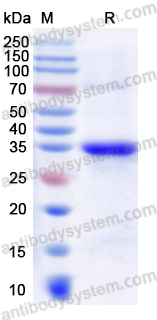Catalog No.
YHJ90401
Expression system
E. coli
Species
Homo sapiens (Human)
Protein length
Met1-Gly312
Predicted molecular weight
36.15 kDa
Nature
Recombinant
Endotoxin level
Please contact with the lab for this information.
Purity
>90% as determined by SDS-PAGE.
Accession
Q9Y617
Applications
ELISA, Immunogen, SDS-PAGE, WB, Bioactivity testing in progress
Form
Lyophilized
Storage buffer
Lyophilized from a solution in PBS pH 7.4, 0.02% NLS, 1mM EDTA, 4% Trehalose, 1% Mannitol.
Reconstitution
Reconstitute in sterile water for a stock solution.
Shipping
In general, proteins are provided as lyophilized powder/frozen liquid. They are shipped out with dry ice/blue ice unless customers require otherwise.
Stability and Storage
Use a manual defrost freezer and avoid repeated freeze thaw cycles. Store at 2 to 8°C for frequent use. Store at -20 to -80°C for twelve months from the date of receipt.
Alternative Names
Phosphohydroxythreonine aminotransferase, PSAT, PSAT1, PSA, Phosphoserine aminotransferase
Single-cell and bulk transcriptome analyses reveal elevated amino acid metabolism promoting tumor-directed immune evasion in colorectal cancer., PMID:40475762
LMTK3 regulation of EV biogenesis and cargo sorting promotes tumour growth by reducing monocyte infiltration and driving pro-tumourigenic macrophage polarisation in breast cancer., PMID:40405280
Halofuginone targets Serine/Glycine synthesis to reverse epidermal growth factor receptor Tyrosine Kinase inhibitor resistance in lung adenocarcinoma., PMID:40354707
m6A/IGF2BP3-driven serine biosynthesis fuels AML stemness and metabolic vulnerability., PMID:40328743
Inhibition of Glutathione Pathway by Oleanolic Acid via PSAT1 Leads to Ferroptosis in Colorectal Cancer., PMID:40320855
The inhibitory receptor LAG3 affects NK cell IFN-γ production through glycolysis and the PSAT1/STAT1/IFNG pathway., PMID:40298450
PSAT1 impairs ferroptosis and reduces immunotherapy efficacy via GPX4 hydroxylation., PMID:40281343
PSAT1 regulated by STAT4 enhances the proliferation, invasion and migration of ovarian cancer cells via the PI3K/AKT pathway., PMID:40211693
An in vivo screen identifies NAT10 as a master regulator of brain metastasis., PMID:40138393
FOXC1-mediated serine metabolism reprogramming enhances colorectal cancer growth and 5-FU resistance under serine restriction., PMID:39773485
PSAT1 promotes the progression of colorectal cancer by regulating Hippo-YAP/TAZ-ID1 axis via AMOT., PMID:39739271
AdipoRon mitigates liver fibrosis by suppressing serine/glycine biosynthesis through ATF4-dependent glutaminolysis., PMID:39662457
Identification and Validation of Serum Biomarkers to Improve Colorectal Cancer Diagnosis., PMID:39628390
N6-Methyladenosine modification activates the serine synthesis pathway to mediate therapeutic resistance in liver cancer., PMID:39489921
Metabolic engineering of the serine/glycine network as a means to improve the nitrogen content of crops., PMID:39450589
Interplay between acetylation and ubiquitination controls PSAT1 protein stability in lung adenocarcinoma., PMID:39433916
PSAT1 is upregulated by METTL3 to attenuate high glucose-induced retinal pigment epithelial cell apoptosis and oxidative stress., PMID:39407268
N6-methyladenosine modification of LATS2 promotes hepatoblastoma progression by inhibiting ferroptosis through the YAP1/ATF4/PSAT1 axis., PMID:39247829
PSAT1 Promotes Metastasis via p-AKT/SP1/ITGA2 Axis in Estrogen Receptor-Negative Breast Cancer Cell., PMID:39199378
New insights into PSAT1 as a therapeutic target for myelodysplastic syndrome (MDS)., PMID:39186541
Knockdown of ERN1 disturbs the expression of phosphoserine aminotransferase 1 and related genes in glioblastoma cells., PMID:39059599
Label-free proteomic analysis reveals the hepatoprotective mechanism of gypenosides in liver injury rats., PMID:38994199
The m6A writer RBM15 drives the growth of triple-negative breast cancer cells through the stimulation of serine and glycine metabolism., PMID:38825643
Shared biomarkers and mechanisms in idiopathic pulmonary fibrosis and non-small cell lung cancer., PMID:38703565
Tanshinone IIA alleviates pulmonary fibrosis by modulating glutamine metabolic reprogramming based on [U-13C5]-glutamine metabolic flux analysis., PMID:38697470
Dual targeting of glutamine and serine metabolism in acute myeloid leukemia., PMID:38690164
Inhibition of signaling protein ERN1 increases the sensitivity of serine synthesis gene expressions to glucose and glutamine deprivations in U87MG glioblastoma cells., PMID:38656254
Bioinformatics and system biology approaches to determine the connection of SARS-CoV-2 infection and intrahepatic cholangiocarcinoma., PMID:38648205
PSAT1 enhances the efficacy of the prognosis estimation nomogram model in stage-based clear cell renal cell carcinoma., PMID:38614981
Phosphoserine aminotransferase deficiency diagnosed by whole-exome sequencing and LC-MS/MS reanalysis: A case report and review of literature., PMID:38546032
Psat1-generated α-ketoglutarate and glutamine promote muscle stem cell activation and regeneration., PMID:38453480
Hub genes, a diagnostic model, and immune infiltration based on ferroptosis-linked genes in schizophrenia., PMID:38390236
Upregulation of serine metabolism enzyme PSAT1 predicts poor prognosis and promotes proliferation, metastasis and drug resistance of clear cell renal cell carcinoma., PMID:38373588
Trps1 predicts poor prognosis in advanced high grade serous ovarian carcinoma., PMID:38212905
Coptisine inhibits aggressive and proliferative actions of fibroblast like synoviocytes and exerts a therapeutic potential for rheumatoid arthritis., PMID:38181676
AMPK-HIF-1α signaling enhances glucose-derived de novo serine biosynthesis to promote glioblastoma growth., PMID:38098117
Wild-type IDH1 maintains NSCLC stemness and chemoresistance through activation of the serine biosynthetic pathway., PMID:38091408
CRISPR screening identifies BET and mTOR inhibitor synergy in cholangiocarcinoma through serine glycine one carbon., PMID:38060314
Vitreous Humor Proteomic Profile in Patients With Vitreoretinal Lymphoma., PMID:38038618
Overexpression of PSAT1 is Correlated with Poor Prognosis and Immune Infiltration in Non-Small Cell Lung Cancer., PMID:37919070
PSAT1 promotes autophagy to resist insufficient autophagy caused by cigarette smoke extract in human airway epithelial cells., PMID:37832835
Hypoxia controls the expression of genes responsible for serine synthesis in U87MG cells on ERN1-dependent manner., PMID:37823569
Constructing and interpreting a large-scale variant effect map for an ultrarare disease gene: Comprehensive prediction of the functional impact of PSAT1 genotypes., PMID:37812589
The Dipeptide Gly-Pro (GP), Derived from Hibiscus sabdariffa, Exhibits Potent Antifibrotic Effects by Regulating the TGF-β1-ATF4-Serine/Glycine Biosynthesis Pathway., PMID:37686422
Integrated of multi-omics and molecular docking reveal PHGDH, PSAT1 and PSPH in the serine synthetic pathway as potential targets of T-2 toxin exposure in pig intestinal tract., PMID:37678681
Afidopyropen suppresses silkworm growth and vitality by affecting carbohydrate metabolism and immune function., PMID:37666622
MicroRNA regulation of the serine synthesis pathway in endocrine-resistant breast cancer cells., PMID:37650685
Integrated analysis of transcriptome and proteome for exploring mechanism of promoting proliferation of equine satellite cells associated with leucine., PMID:37633218
Increased serine synthesis in cumulus cells of young infertile women with diminished ovarian reserve., PMID:37533289
Exosomal ERBB2IP contributes to tumor growth via elevating PSAT1 expression in non-small cell lung carcinoma., PMID:37192746

